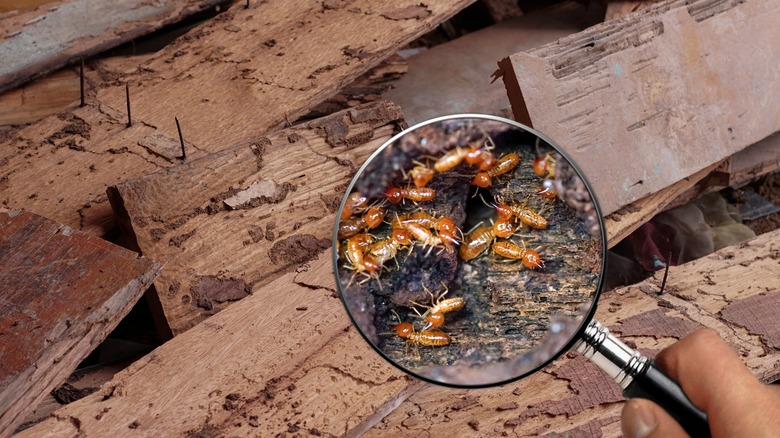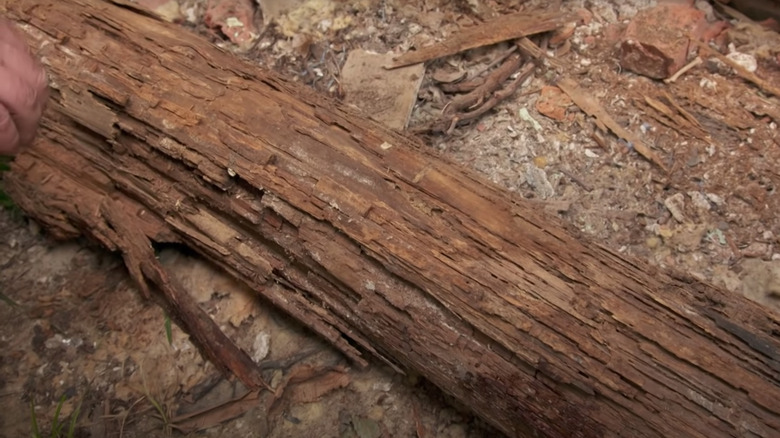The Pros And Cons Of Using Orange Oil To Eliminate Dry Wood Termites
Dry wood termites, noted for their ability to build a successful colony on dry hardwood, are problematic to structures and are hard to get rid of. However, orange oil is sometimes a recommended solution. One of the key advantages to using orange oil to eliminate dry wood termites is that it's a natural substance and, therefore, less worrisome than the toxins found in most other products.
There's no doubt that orange oil can work as a pest control, including helping with a wide range of problems, from ants and dust mites to the hard-to-kill cockroach. Yet, there are some questions about its effectiveness against dry wood termites. When time matters, and you need to get your home treated before structural problems arise, should you trust orange oil to get rid of termites? Before purchasing this type of treatment, you should consider the pros and cons of using it a bit more carefully. Also, if you want more help, don't overlook the importance of calling in a professional exterminator with termite experience to tackle this worrisome problem for good.
What is orange oil and why should you consider it
Orange oil is an essential oil, which means it is a highly concentrated oil derived from the plant Citrus sinensis, also known as the typical sweet orange. Manufacturers extract the natural oil found in the orange rind, though in some cases, other parts of the plant may be used. However, how can something that comes from an orange be toxic to pests like termites?
Orange oil contains D-limonene, and its presence keeps the pests away from oranges in general, unlike other fruits. One of the reasons for this is the way orange oil interacts with the pests. In termites, for example, it causes damage to the exoskeletons, leading to the destruction of the pest itself. It works to destroy the cell membranes of the termite and ultimately kills it due to the loss of protein and hydration. It's also capable of wiping out infestations because it destroys eggs. Dry wood termite infestations cannot thrive in areas where this oil is present. Orange oil can be a component of your pest control strategy, but that doesn't mean it's always effective, especially in situations where you have a large infestation. However, you should consider it as an organic product capable of providing prevention, early treatment, and controlled elimination of infestations.
The benefits of orange oil for dry wood termites
The biggest benefit of orange oil for dry wood termites is that it's not a chemical. Unlike other pesticides and termite treatments, you don't have to tent your home to fumigate or find somewhere else to live until treatment is complete. In those situations, the home is being infiltrated with chemicals to kill the pests, and it's likely some of those chemicals could linger. Orange oil, on the other hand, is a natural substance that's considered to be a less toxic alternative. Many of the chemicals used to treat termites, such as fipronil, hexaflumuron, and imidacloprid, are typically found in common pest-killing products.
Orange oil is also safer for the environment. But what about its effectiveness? When choosing any type of treatment for termites, it has to work, and orange oil can work in some cases. If you apply it to the insects directly, such as placing the oil near or on the insects, they will die from it. When placed on the wood surface that the pests need for food, the termites must either move on or they will starve, as they cannot consume wood with orange oil on it. In this way, it can be an effective, desirable treatment.
The drawbacks of orange oil for dry wood termites
Orange oil sounds like an excellent choice for dry wood termites, but there are some significant limitations to remember. First, there are risks to some people who come in contact with orange oil, especially in large amounts. It can cause mild side effects in some people, such as skin inflammation and irritation, according to Holland and Barrett. Some people may suffer serious side effects, including vomiting, nausea, irregular heartbeats, and trouble breathing.
The other significant drawback is that it's not highly effective in all termite infestations. That is, it works best as a type of repellent to help keep termites away. To be effective at killing them, the orange oil must come in contact with the pests, and that's hard to do in situations where the termites are hidden under the stairs of your home or in the foundation. If you have a severe infestation, it's not likely to be enough to eliminate it, leading to the risk of the infestation spreading. The secondary reason for that spread is that orange oil doesn't last long. It can work briefly, but you'll need to reapply it consistently to keep the bugs at bay, especially for underground control of these pests, where most dry wood termites thrive.
Using orange oil over fumigation
Once you know you have a significant termite infestation in or under your home, taking quick action is critical. If you see an active colony, dry wood feces, peeling paint, or other signs of their presence, it's best to contact an exterminator for immediate help. A full termite inspection is typically necessary to determine the extensiveness and proper treatment. If there's evidence of damage or a large colony, fumigation of the home may be necessary. In this situation, orange oil will likely be ineffective.
However, fumigation is an invasive, expensive process that involves sealing off the home and treating it with chemicals. Fumigating can work well but is best done by a professional because of the toxins involved. Alternatively, if the termite inspection doesn't show significant invasive spread of the colony, it may be possible to treat the infestation with orange oil. Treating termites yourself will cost less, but it requires more careful planning and work to ensure you achieve your desired goal.
How to get the most out of orange oil for termite control
If you decide to use orange oil for dry wood termite control, purchase a high-quality product. Look for those with a high concentration of orange oil that primarily comes from the rind. Once you have the product in hand, you'll need to apply it as thoroughly as possible to the impacted area. This may mean drilling into wood spaces where the colonies are near or infiltrated and filling them with the substance. Typically, this can provide some level of protection for up to three weeks. The orange oil works to kill any termites that come into contact with it, but also contaminants the wood in that area, causing the pests to avoid eating it, and they then starve.
Consistency is key here. You'll need to keep treating the area until all signs of the infestation are gone. Then, you'll need to monitor it over time to ensure that you treat the area again if there's any sign of redevelopment. This isn't easy to do since termites tend to be difficult to see, but an expert pest control company visit and inspection could pinpoint key areas of concern, allowing you to focus your efforts where it's likely to count most.





